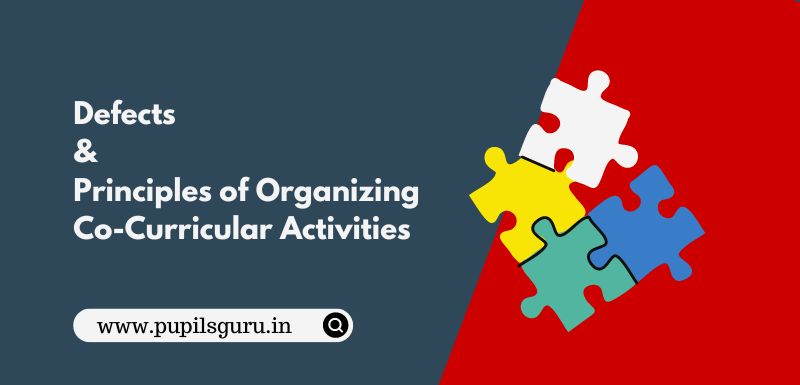Co-curricular activities are as important as the academic activities in a school. While organizing the co-curricular activities, there might be some defects in their organization. In this article, we will discuss the main defects in the organization of co-curricular activities. Also the main principles of organizing co-curricular activities in a school effectively.

8 Main Defects in The Organization of Co-curricular Activities in a School
The co-curricular activities fail to achieve the desired purpose if they are not properly organized. These activities are either neglected or poorly organized in our schools. The defects in the organization of co-curricular activities are as follows.
#1 Lack of interest on the part of the headmaster:
Very often the headmaster does not take an interest in the co-curricular activities of the school. He regards these activities as a sheer waste of time, effort, and money. Such a headmaster will not allocate funds for the activities. This will have an adverse effect on the organization of activities.
#2 Lack of interest on the part of teachers:
Very often, the teachers do not take an interest in these activities. They are generally overburdened with academic work. They find very little time for activities. Moreover, their efficiency is judged by showing a pass percentage in the examination only. So their attention is focused on the examination results.
#3 Lack of interest on the part of pupils:
The pupil’s evaluation is also done on the basis of their achievement in the examination. No credit is given for achievement in such activities. So they take little interest in the co-curricular activities of the school.
#4 Lack of variety:
In the schools, only a few activities are organized but there are individual differences. All are not interested in the same activity.
#5 Lack of Equipment:
Activities cannot be effectively organized without proper equipment and provisions. Some schools do not have playgrounds for the organization of games, sports, etc. The schools may not have sufficient equipment for organizing dramatics, sports, library work, exhibitions, scientific hobbies, etc.
#6 No provision in regular timetable:
Very often, activities are not adjusted in the regular timetable. These are organized in after school hours and, therefore, the teachers and the students do not take interest.
#7 Lack of adequate staff:
Some activities like sports, music, crafts, scientific work, and hobbies need specialist teachers. Some schools do not have sufficient staff for academic work, not to speak of specialized staff for activities.
#8 Lack of Guidance:
The pupils are not able to take an active part in these activities as they do not receive proper guidance from the staff. Either the teacher is disinterested or he is not able to provide expert guidance in a particular activity.
Also Read: What are Co-Curricular Activities? – Their Types and Importance.
7 Principles of Organizing Co-curricular Activities in School
A certain number of principles are needed to be followed while organizing co-curricular activities effectively in a school. The main principles that should be kept in mind while organizing these activities are discussed below.
#1 Proper selection:
The activities should be properly selected keeping in view and level and interest of pupils and available facilities in the school. The educational value of the activity should be the main consideration.
#2 Adjustment in the time-table:
Activities should form an integral part of a school program. There should be activity periods in the timetable. Activities done after school hours, do not evoke interest in pupils and teachers.
#3 Providing necessary equipment:
No activities can be organized properly without the necessary equipment and provisions. The arrangement must be made well in time. Certain materials or equipment may be purchased by the school.
#4 Encouraging pupil’s participation:
Every effort should be made to encourage pupils to take an active part in school activities. There should be due credit for participation in activities. It may be in the form of prizes, merit certificates, or assessments. Pupils should be asked to choose activities of their interest.
#5 Specifying time, date and place:
There should be proper specifications for the time and place of an activity. Information regarding these specifications should be given well in advance so that there is sufficient time for preparation.
#6 Providing guidance:
For effective organization and conduct of activity, the pupils should be properly guided. The teachers who are conversant in the activity should guide the students for successful participation. In the absence of such guidance, the activity may not serve its purpose.
#7 Balancing teachers’ workload:
The teachers who are to organize these activities, should not be overburdened with academic work. A teacher who takes an active interest in organizing the activities must be given due appreciation and credit. Co-curricular activities serve their useful purpose when they are properly organized.
This is possible if the headmaster and the teachers are interested in organizing these activities. These activities should not be considered extra, but an integral part of the curriculum for the complete education of children.